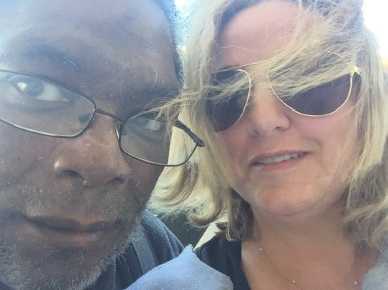|
Let It Fade: Living With a Mental Illness and Having Another Significant Health Problem
Monday, December 15, 2025 |
Rev. Beth Cantrell & James Crawford, Jr. | Legion Talks — 4 |
Have you been walking on a surface that’s uncertain
Have you helped yourself to everything that’s empty
You can’t live,
This way too long,
There’s more than this,
More than this
Have you been standing on your own feet too long
Have you been looking for a place where you belong
You can rest,
You will find rest
[CHORUS]
Let this old life crumble,
Let it fade,
Let this new life offered be your saving grace,
Let this old life crumble let it fade,
Let it fade
-Jeremy Camp
<Beth writing> A week ago a radiologist called me at work. A few hours earlier I had a CT scan. She instructed me to report to the Emergency Department immediately because I either had appendicitis or cancer of the appendix. I did not have appendicitis. What followed was a virtual onslaught of phone calls, dates, and emails. Then on Monday a very gifted GI LPN (Licensed Practicing Nurse) managed to push all of the dates forward.
So far my primary experience of having cancer is dealing with the abject frustration of extreme demands on my time.
But my lovely, bleeding heart therapist missed the larger point today. She missed why I feel so frustrated. Yes, it’s daunting to have so many appointments duplicated. Yes, the sheer amount of phone calls stress me to the marrow. No, there’s not anything that endears me to the medical establishment when I have a phone call at 7:35am. I feel bombarded. I am bombarded.
I feel this level of abject stress because I feel like such a piece of shit. I was a sick child. I’ve been a sick, compromised, underperforming adult due to bipolar. I’ve missed a thousand days of productivity due to sinus infections. Where is my call? Why can’t I get a job? What do I have to offer Chris besides more hardship?
A week and a day ago I was a sick person who was struggling. Now everything will grind to a halt. The medical bills will soar. I will be scarred. I have even less to offer. Trying to find a full-time job is farther away. I will be more of a financial imposition. I will need help.
Romans 14:7-9 NRSV says 7 We do not live to ourselves, and we do not die to ourselves. 8 If we live, we live to the Lord, and if we die, we die to the Lord; so then, whether we live or whether we die, we are the Lord’s. 9 For to this end Christ died and lived again, so that he might be Lord of both the dead and the living.
I am sure that if the inevitability of death comes closer that I will experience less certainty. That’s fine. Like any bipolar mood, I’ll take that too. I certainly acknowledge that I may be experiencing some measure of latent passive suicide. But honestly, the appeals of this old life are gone except for Chris when he isn’t making me ape shit mad.
Let it fade.
 Legion Talks with Crawford & Cantrell features
James Crawford, Jr., a retired insurance
executive, and Rev. Beth Cantrell as two friends
who discuss mental health, addiction, race,
homelessness, faith, fear, fatigue, and
friendship.
Legion Talks with Crawford & Cantrell features
James Crawford, Jr., a retired insurance
executive, and Rev. Beth Cantrell as two friends
who discuss mental health, addiction, race,
homelessness, faith, fear, fatigue, and
friendship.
Our Brother Legion educates, equips, and empowers FaithFolks & Allies to create belonging for/with/on behalf of people living with mental illness, addiction, trauma, and spectrum disorders.
Our Brother Legion is a 501(c)3. Your donation pays salaries and stipends for contributors, advocacy materials, and expenses. Please give as you are able.
Thank you for your support of Legion Talks.
Our Brother Legion sponsors four programs:
- Legion Talks with Crawford & Cantrell
- Pentecost Rising Mobile Pastoral Care
- Outlive Your Despair
- Brambles- the IDD component of Legion.

